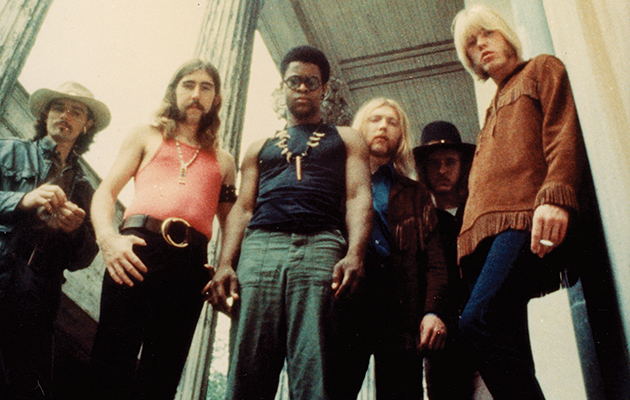After the nascent band’s collective epiphany, “my brother called me up in LA and told me to get my ass back to Jacksonville”, Gregg Allman recalls. “He said, ‘I’m tired of bein’ in the studio. I got this black guy Jaimoe and Butch Trucks to play drums. I got a hell of a bass player, and with him I got a lead guitar player. I’m gonna send you a plane ticket.’ I said, ‘Don’t do that, man. You ain’t got the dough. I’ll just hitchhike.’ He didn’t want me to hitch ’cos that’s how our dad was killed. But I got a ride all the way.”
Gregg got dropped off, and Duane took him straight to the dilapidated Victorian house where the band were crashing and rehearsing. “They blindfolded me and led me into this room, and there was this brand-spankin’-new 1969 Hammond B3. They said, ‘We’ll see you in about a week. You learn all you can.’ And there was a boombox and all kinds of cassette tapes. After I’d been there a couple days, we went straight down to this makeshift studio and cut ‘Dreams’, and even then it sounded just like it does today. We’d hit this spontaneous shift and we’d all look around at each other and go, ‘Whoa, where did that come from?’ We just flat knew. So I was in, dig? I belonged. Boy, it felt so good. The next week I wrote ‘Whipping Post’, ‘Every Hungry Woman’, ‘Blackhearted Woman’ – I was just spittin’ ’em out. Most of the first album I sat there and wrote in the third storey of that house.”
Butch picks up the plot. “So we got this band going with those kind of feelings and with absolutely no expectations of making any money. Atlantic Records was telling us, ‘You gotta be kidding. A bunch of white guys just standing there playing – forget it. Get that blond-headed kid out from behind the organ, stick a salami down his pants, let him jump around onstage and maybe you got a chance.’ But we just went, ‘Fuck it.’ We didn’t care, we were havin’ so much fun playin’ this music. We were going back and using the blues and rhythm and blues, and then looking for new horizons. Jaimoe turned us on to Trane and Miles. I mean, ‘Dreams’ is ‘My Favorite Things’. ‘In Memory Of Elizabeth Reed’ – what rock’n’roll band was playin’ that kind of stuff?
“We were also taking a lot of acid and any other mind-altering things we could find, and that opened us up to be able to go for it. We were stretching the limits of what had been done in rock’n’roll. There’d be a very loose structure, but for the most part it was wide open to do whatever the fuck you wanted to do. Half the time it’d be a trainwreck, so we’d shut it down, let it drift around for a while and eventually we’d find something that would click, and it would take off.
“And that weekend in March of ’71 when we recorded At The Fillmore East, most of the time it clicked. We were finally starting to catch up with what we were listening to. We had lived together, fucked together, done drugs together, got in trouble together; we all just moved as a unit. And then, when we got onstage to play, that’s what it was all about – and it just happened to all come together that weekend.”
“We were not the closing act for that weekend,” Butch points out; “we were the special guests for Johnny Winter, which meant that, if things had stayed that way, we would’ve only had 90 minutes to play, and some of our songs lasted that long. And believe me, Bill Graham was a stickler. But Thursday night, after we finished playin’ – and this was like our sixth or eighth time at the Fillmore – about half the crowd got up and walked out. And Johnny Winter’s manager went back to Bill Graham and said, ‘Well, I don’t guess Johnny’s gonna be closin’ for the Allman Brothers any more.’ So we flipped with Johnny and got to close and play as long as we wanted to, at least on the late shows.”
The four remaining shows would be recorded by veteran Atlantic engineer/producer Tom Dowd, who’d not only produced the Allmans’ second album, Idlewild South, but also the sessions for the Derek & The Dominos project, putting Duane together with Eric Clapton for some mind-blowing extended guitar duels. That LP, Layla…, dramatically backed up those who’d been calling the upstart Allman Brothers Band the most exciting live act on the planet, and its little-known 24-year-old leader a fiery six-string virtuoso to rival Clapton, Beck and Page.
Dowd and Atlantic, consequently, wanted to put out a live album to capture a skilled and adventurous band in full flight, the two guitars circling each other like killer falcons, stretching the material into thrilling, electrifying shapes. No matter that the Allmans had yet to tackle most of their live material in the studio – this band wasn’t about the studio. “If we could just get people to come out and see us,” Duane Allman told me on the Friday afternoon, before their first pair of headlining sets, “I know they’d like what they heard.”



